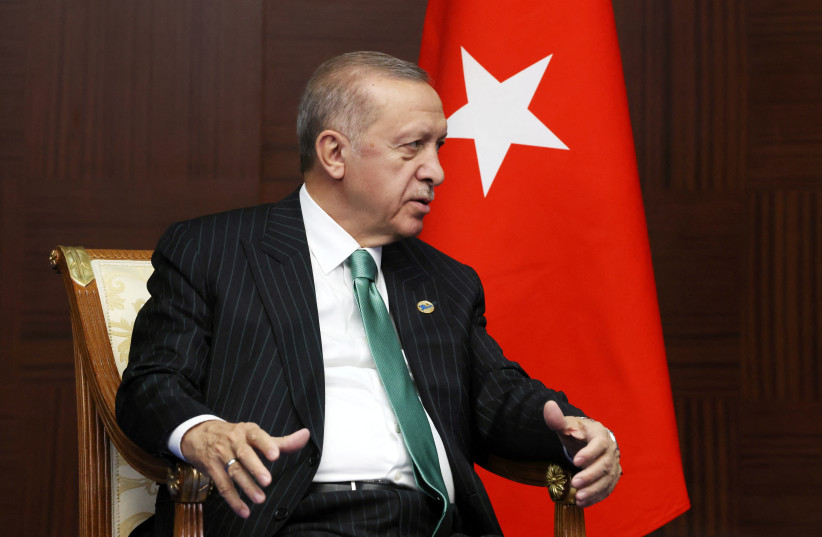Turkey’s recent announcement that it would become a hub for Russian gas exports to Europe could be an election ploy that will not become reality, analysts have told The Media Line, as the US put more pressure on its NATO ally over sanctions against Moscow.
For more stories from The Media Line go to themedialine.org
Turkish President Recep Tayyip Erdogan claimed on Wednesday that he agreed with his Russian counterpart on Turkey becoming a hub for natural gas.
“In our last meeting, we agreed with [Russian President Vladimir] Putin on this issue. We will create a hub here with Turkish gas coming from Russia," Erdogan said, according to the Turkish state news agency.
The statement came on the same day as a US treasury official ended her visit to Turkey to discuss sanctions on Russia over its invasion of Ukraine, something that Ankara has not imposed on the country.
Aydin Sezer, an Ankara-based foreign policy analyst with a focus on Turkish-Russian relations, believed the announcement was for political gain and was skeptical whether the decision would actually become reality.
He stressed that in order for Turkey to become a hub it would have to be able to set the price for gas, which was unlikely, instead of simply helping transmit the energy.

“Mr. Putin shows the west that we can cooperate with Turkey on this issue.”
Aydin Sezer, foreign policy analyst
Sezer stated that due to sanctions, no new pipelines would be able to be built and it would be unlikely that the gas would find a buyer as European countries are steering away from Russia as an energy source since the full-scale invasion of Ukraine.
He argued the statement was politically motivated.
“Mr. Putin shows the west that we can cooperate with Turkey on this issue. Turkey is a part of NATO. Turkey has relations with the European Union but [is] cooperating with Russia, and at this time, under the sanctions,” Sezer told The Media Line.
He added that the announcement would also be beneficial to Erdogan eight months before national elections are due.
Polls have regularly shown him behind several opposition politicians as the country grapples with massive inflation reported at more than 80 percent, with even some of his party’s supporters blaming him for Turkey’s strained economy.
“It’s obviously election driven, trying to present an image of lots of optimism and hope for the future,” said Timothy Ash, an economist focused on Turkey and Ukraine.
Ash told The Media Line he was also not convinced that the hub would happen since it was unclear who would buy the gas, as most European countries do not want to rely on Russia as an energy source any longer.
“Russia is now proven to be an unreliable supplier of energy to the West. The game plan is absolutely to cut Russia out of Western energy supply chains,” Ash told The Media Line.
He said that Turkey could be a major player in the energy sector due to gas exploration off its coastlines on the Black Sea and the eastern Mediterranean Sea.
Turkey's bid to become an energy hub
Ankara has been keen to play more of a role in energy markets.
It repeatedly expressed its interests in cooperating with Israel on the topic while it restored diplomatic relations with the country.
Israel is in an eastern Mediterranean gas forum with some of Turkey’s top rivals, which analysts believe has led to Ankara feeling boxed-in.
Turkey has also been drilling for gas off the coast of Cyprus, stating that it has an agreement with a Turkish Cypriot government that controls part of the island’s territory, which is only recognized by Ankara.
When asked about the gas hub, the US State Department said it would continue to tell Ankara not to be a safe haven for sanctioned Russian assets or transactions.
“We have continued to urge our allies to take steps to diversify their energy sources, to reduce energy reliance on Russia. And in the case of Turkey, we are working with them closely to assist in their own efforts to enhance energy security in the long term,” said US State Department Deputy Spokesperson Vedant Patel.
A US treasury department official visited Turkey this week to discuss Russian sanctions with officials.
A statement by the department said that Assistant Secretary for Terrorist Financing and Financial Crimes Elizabeth Rosenberg visited Turkish government officials, as well as members of Turkey’s business community to discuss sanctions and exports controls on Russia and anti-money laundering policy.
“These meetings affirmed the importance of close partnership between the United States and Türkiye in addressing the risks caused by sanctions evasion and other illicit financial activities,” the statement said.
